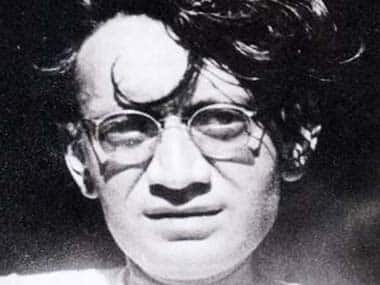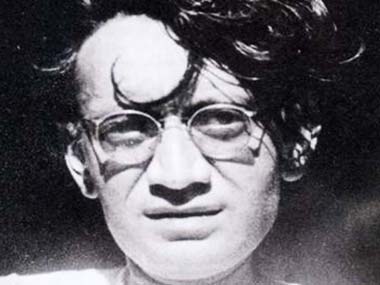What happens when the city you’re familiar with suddenly becomes a new country? Manto tells us this by taking a stroll through the lanes of Lahore, a city that was India and has now become something else. Savere jo kal aankh meri khuli by Saadat Hasan Manto, translated by Aakar Patel It was a strange season and a strange morning. The thought kept coming to me: “Get out of the house. Go to the garden.” So I left. [caption id=“attachment_697733” align=“alignleft” width=“380”]  Saadat Hasan Manto. Agencies.[/caption] On the way there, I walked through the bazaars and the neighbourhoods. Most of these I had already seen before, but what they have become after Pakistan became “Zindabad” I saw for the first time yesterday: ‘Pakistan Zindabad - Mohajir haircutting saloon’, ‘Pakistan Zindabad - We fix locks’, ‘Pakistan Zindabad - Garam chai stall’, ‘Pakistan Zindabad - Hospital for sick pets’, ‘Pakistan Zindabad - This shop has been allotted to Syed Anwer Husain Mohajir from Jalandhar’. And so on. Outside a building I even saw this ‘Pakistan Zindabad - This property belongs to a Parsi’. Meaning don’t allot it by mistake. It was a strange season and a strange morning. Almost all the shops were shut. A halwai was open. I thought a glass of lassi would be refreshing. In the shop I noticed that the fan was on, but turned away from both customers and owner. I was curious and asked why that was. The owner glared at me and said: “Can’t you see?” I looked. The fan was pointed in the direction of a poster of our great leader Mohd Ali Jinnah. I shouted “Pakistan Zindabad!” and left without the lassi. In front of one shop a man sat frying pooris. I thought I had bought chappals from the same shop just a couple of days ago. Where did that go? It was the same board, and in front was the same building gutted in the riots, in whose balcony a fan was hanging. I wondered if it had fanned the flames. “What are you thinking about?” the pooriwala said behind me, “they’re fresh and hot!” I said: “I’m thinking - didn’t there used to be a shoe-shop where you’re sitting?” He wiped the sweat off his brow and smiled. “It’s still here. It opens at 9. I open at 6 and am done by 8:30.” I moved on. I saw a man bent over some pieces of glass on the road. At first I thought he was a good man, picking out larger pieces he was worried would trouble pedestrians. But it then became clear that he was actually scattering them around thoughtfully here and there. I stood at a distance to figure out why. Once he was done, he walked to the side of the road under a board that read: “Cycle puncture and repair shop”. I walked faster. There was one nice change to the boards of the shops. Earlier almost all used to be in English. Now their names and descriptions were in Urdu. When in Rome, as they say. Some had Arabic names and some Farsi. One shoe shop was called Paposhiana, probably meaning an ashiyana for shoes. I was pleased. I shouted “Pakistan Zindabad!” and moved on. I saw next a strange cart erected on four cycle wheels. I asked what it was. “Hotel” I was informed. A travelling hotel. There was a stove and pan for chapatis, four gravy dishes were ready, a pan to fry shami kebabs, two pots of water, ice, bottles of lemonade, a pot of curds, glasses, plates. All of it. Amazing. A little ahead, a man was slapping a boy around. On asking why, I was told the child was a servant who had lost a one-rupee note. I confronted the man: “What’s the matter with you? He’s only a child. A one-rupee note is really a scrap of paper. He must have dropped it somewhere. Don’t you dare hit him for it.” The man didn’t back down. “It may be a scrap of paper for you. Do you know how much effort is put in to earn one of those?” Saying this, he once again began to thrash the boy. I couldn’t stand it any longer. I fished out a rupee from my pocket and gave it to the man. I walked on. A few paces later, a fellow put his hand on my shoulder. He was smiling. “You gave a rupee to that bastard, didn’t you?” “Yes,” I said, “he was hitting the poor child.” “The poor child is his son,” the man said. “What?” “They collect a few rupees in this way every day.” “Fine,” I said and walked on. Ahead, there was chaos. Some boys with bundles of paper were shouting and running about. I heard many accents and languages. They were selling newspapers and shouting out the latest headlines. A shoe had been flung in Delhi, dogs had attacked a leader’s house in Lucknow, Kashmir would be liberated in two weeks. There were many papers. There was ‘Nawa-e-Subah’, there was ‘Abu-al-Waqt,’ and there was ‘Sunehra Pakistan’. I noticed a woman there. She was about 50 and serious-faced. She had a cloth bag in one hand and a bundle of newspapers in the other. “Are you selling those?” I asked. “Yes.” I bought two and moved on, thinking about her situation. A pack of dogs was running towards me. Snarling, sniping, loving and biting each other at the same time. I stood to the side, frozen in fear. I had been bitten only a couple of weeks before and had been injected 14 times in my stomach with 10cc shots. I wondered if the dogs were refugees from the other side or had been left behind when their masters went over. Whatever it was, I felt, they should be cared for. Those that were refugees should be rehabilitated. Those who were master-less should be allotted to Pakistanis who had left their dogs behind. Then the pack moved on and I calmed down. I began to walk again, opening one of the newspapers. There was a photograph of an actress inside, in colour. She was wearing little. The caption read: “See how obscene the movies have become.” I said “Pakistan Zindabad” in my head and tossed the paper onto the street. In the second paper, I spotted this little classified. “Yesterday, I left my cycle outside Lloyd’s Bank. On returning, I found my new saddle replaced by a broken old one. I’m a poor refuge. Whoever took it, please return my saddle.” I laughed out aloud. I folded the paper and put it in my pocket. A little ahead was a burnt shop. A man sat inside with two large slabs of ice on the floor. The thought came to me: “At last the poor shop has the chance to cool itself.” Now some cycles were going by. On one, a man was riding with a burqa-wearing woman on the carrier behind. A couple of minutes later, a similar couple went by but this time the burqa-wearing woman was sitting in front, on the handle. Their cycle went over the skin of a watermelon and began to slip. The man braked. The slipping/stopping motion was too much and they tumbled. I ran to help. The man was wrapped in the burqa and the poor woman was under the cycle. I lifted it and helped her up. The man disentangled himself from the burqa and said to me: “You stay away. We don’t need your help.” He wrapped the burqa back haphazardly over the woman and sat her on the handle again. They left. I prayed there wasn’t another watermelon skin ahead. I walked on. There was a sign on the wall that caught my eye. It was relevant. The headline said: “Muslim women and purdah”. A little ahead I came to a familiar chowk, but its statue was missing. I asked a man where it had gone. “It went” he said. “On its own?” I asked. He laughed: “No, they took it.” “Who?” “Those who owned it.” I thought to myself, even statues were now refugees. There might come a day when corpses would also be dug up and moved across the border. I was about to leave when a man, out for a stroll like me, said: “It hasn’t gone anywhere. It’s still here. And safe.” “Where” I asked. “The museum.” I prayed - “God, please don’t let me be around when they put people in the museum too because they are different.” I moved on. A refugee from Delhi and his little boy were walking on the footpath just ahead of me. The kid said “Dad, let’s eat chole today.” The father sternly said: “Not chole, it’s chane.” The kid said: “No dad, chane is what we get in Delhi. Here they eat chole.” Dad calmed down. I had now reached Lawrence Bagh, my destination. It was the same place but lacked the usual bustle. There were no women around and I wondered why. The sound of blaring song jolted me out of my thoughts and I realised where they were. Being entertained in the zoo by something other than flowers and plants and the joys of nature. This depressed me. Anyway, as I was leaving a man stopped me. “Is this Bagh-e-Jinnah?” “No,” I said, “this is Lawrence Bagh.” He laughed. “It was renamed Bagh-e-Jinnah after Partition.” “Pakistan Zindabad!” I said to him. He laughed louder and went in. I felt I was just coming out of hell.
What happens when the city you’re familiar with suddenly becomes a new country? Manto tells us this by taking a stroll through the lanes of Lahore, a city that was India and has now become something else.
Advertisement
End of Article
Written by Aakar Patel
Aakar Patel is a writer and columnist. He is a former newspaper editor, having worked with the Bhaskar Group and Mid Day Multimedia Ltd. see more


)
)
)
)
)
)
)
)
)



